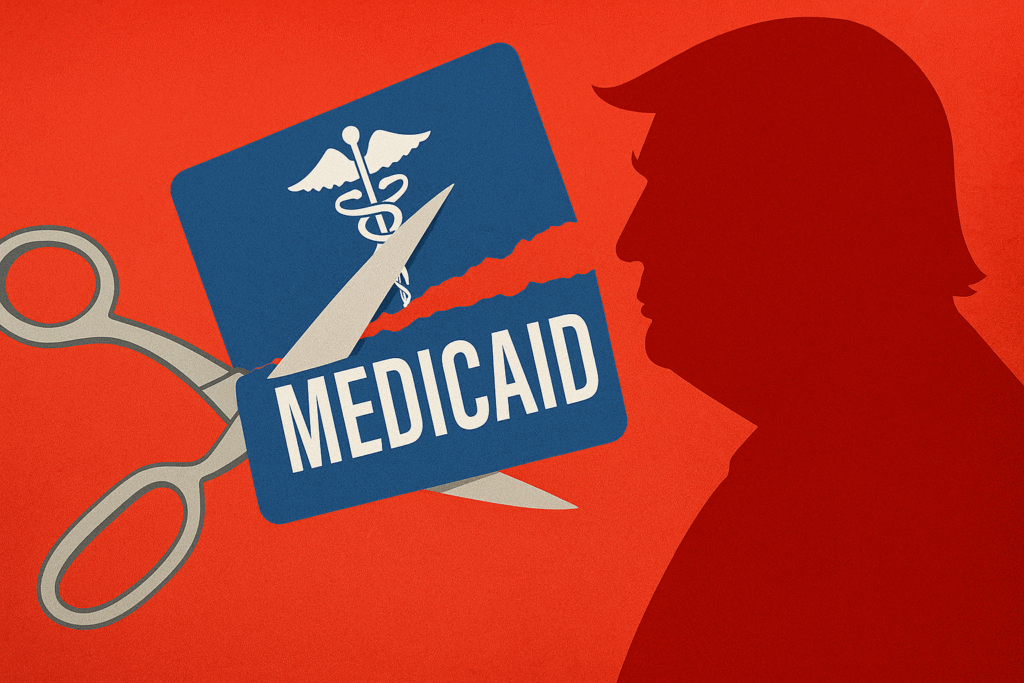The U.S. Senate has passed President Donald Trump’s wide-ranging tax and domestic spending package, a move that could significantly reshape the country’s health care safety net. Nicknamed the “Big Beautiful Bill,” the legislation includes steep cuts to Medicaid—potentially stripping health coverage from millions of low-income Americans.
Nearly $1 Trillion in Medicaid Cuts
At the heart of the legislation is a nearly $1 trillion reduction to Medicaid, the joint state-federal program that insures more than 83 million low-income individuals, including children, people with disabilities, and nursing home residents. According to estimates from the Congressional Budget Office (CBO), these cuts could result in 11.8 million people losing coverage over the next decade.
The legislation would also impact another 5 million people if Congress fails to renew pandemic-era tax credits that helped make Affordable Care Act (ACA) plans more affordable.
“This would be the largest rollback of health care coverage in U.S. history,” said Joan Alker, executive director of Georgetown University’s Center for Children and Families.
Eligibility Checks and Work Requirements
The bill introduces stricter requirements for Medicaid eligibility. Starting January 1, 2027, states would be required to:
- Double eligibility checks to twice a year.
- Implement work requirements, mandating that “able-bodied” recipients work at least 80 hours per month unless exempt due to disability, student status, or caregiving duties.
- Expand work mandates to include parents of children over 13, not just childless adults as initially proposed.
- Remove access to Medicaid for undocumented immigrants, even if enrolled through state-funded programs.
Policy experts warn that these requirements will increase administrative costs and result in coverage loss for eligible individuals due to bureaucratic errors.
Health Care Community Responds
The bill’s passage has sparked backlash from hospital associations and health advocates, especially in rural and underserved areas. While the Senate added a $50 billion rural health care fund, critics argue it will not compensate for the wider impact of Medicaid reductions.
Rick Pollack, President and CEO of the American Hospital Association, called the legislation “deeply disappointing,” warning that the cuts would cause “irreparable harm to our health care system.” He added that hospitals might be forced to lay off staff, reduce services, or even shut down in some communities, increasing wait times and uncompensated care.
Dr. Richard Besser, President of the Robert Wood Johnson Foundation, emphasized the human cost of the bill, stating, “These cuts will make our country sicker, put children at risk of hunger, and make it harder for families to afford basic needs.”
Timeline for Implementation
While the bill sets a 2027 deadline for full implementation, some states have already requested waivers to begin earlier. The Centers for Medicare & Medicaid Services (CMS) may approve these waivers, accelerating the rollout of work requirements.
A recent KFF (Kaiser Family Foundation) survey shows that two-thirds of Medicaid recipients already work, and most others qualify for exemptions. Only 8% are not employed for reasons such as job unavailability or retirement.
Jennifer Tolbert of KFF noted that states will need to adjust their systems, anticipate reduced federal Medicaid payments, and prepare for costly administrative updates to comply with the law.
Grassroots Opposition and Lobbying Efforts
The bill’s passage has mobilized health care workers and advocacy groups. Johannah Alabi, a nursing home worker in Connecticut, joined members of the Service Employees International Union (SEIU) to lobby against the legislation on Capitol Hill.
“Most of our residents depend on Medicaid,” Alabi said. “If that money’s taken away, it’s going to impact food, care, and quality of life.”
SEIU members protested with signs reading “Death by a trillion cuts” and shirts that said “Republican cuts kill.” One SEIU worker, Jennifer Woods, said she tried to explain the impact to Senator Ted Cruz (R-Texas), but he did not respond.
What’s Next
The House of Representatives is set to consider the legislation on July 2. If passed, it would head to Trump’s desk ahead of his self-imposed July 4 deadline, marking one of the most significant domestic policy victories of his administration.
Critics say the bill prioritizes tax cuts and immigration enforcement at the expense of basic health care access. Supporters, including Vice President JD Vance, argue that Medicaid reforms are necessary to curb government spending and enhance national security.
The ultimate effect of the bill, however, may be felt most acutely by the millions of Americans who rely on Medicaid not just as a program, but as a lifeline.



